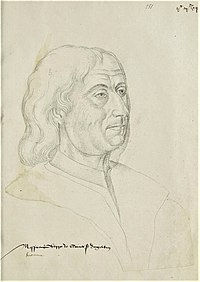Philippe de Commines
| Philippe de Commynes | |
|---|---|
 |
|
| Born | 1447 Renescure, Flanders |
| Died | c. 1511 Argenton-les-Vallées, Poitou |
| Occupation | writer, diplomat, politician |
Philippe de Commines (or de Commynes or "Philippe de Comines"; Latin: Philippus Cominaeus; 1447 – 18 October 1511) was a writer and diplomat in the courts of Burgundy and France. He has been called "the first truly modern writer" (Charles Augustin Sainte-Beuve) and "the first critical and philosophical historian since classical times" (Oxford Companion to English Literature). Neither a chronicler nor a historian in the usual sense of the word, his analyses of the contemporary political scene are what made him virtually unique in his own time.
Commines was born at Renescure (in what was then the county of Flanders), to an outwardly wealthy family. His parents were Colard van den Clyte (or de La Clyte) and Marguerite d'Armuyden. In addition to being seigneur of Renescure, Watten and Saint-Venant, Clyte became bailiff of Flanders for the Duke of Burgundy in 1436, and had been taken prisoner at the Battle of Agincourt. Philippe took his surname from a seigneurie on the Lys which had belonged to the family of his paternal grandmother, Jeanne de Waziers. His paternal grandfather, also named Colard van den Clyte (d. 1404), had been governor first of Cassel and then of Lille. However, the death of Commines' father in 1453 left him the orphaned owner of an estate saddled with enormous debts. In his teens he was taken into the care of Philip the Good (1419–1467), Duke of Burgundy, who was his godfather. He fought at the Battle of Montlhéry in 1465 and the Battle of Brusthem in 1467 but in general seems to have kept a low profile.
...
Wikipedia
